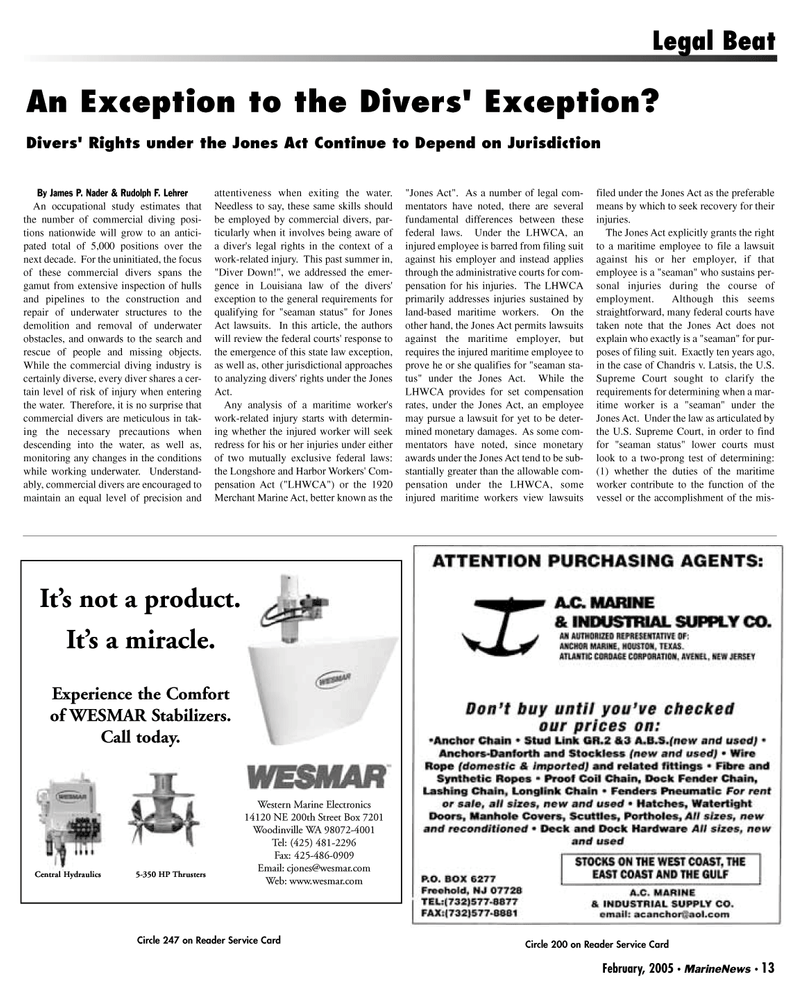
Page 13: of Marine News Magazine (February 2005)
Read this page in Pdf, Flash or Html5 edition of February 2005 Marine News Magazine
February, 2005 • MarineNews 13
Legal Beat
By James P. Nader & Rudolph F. Lehrer
An occupational study estimates that the number of commercial diving posi- tions nationwide will grow to an antici- pated total of 5,000 positions over the next decade. For the uninitiated, the focus of these commercial divers spans the gamut from extensive inspection of hulls and pipelines to the construction and repair of underwater structures to the demolition and removal of underwater obstacles, and onwards to the search and rescue of people and missing objects.
While the commercial diving industry is certainly diverse, every diver shares a cer- tain level of risk of injury when entering the water. Therefore, it is no surprise that commercial divers are meticulous in tak- ing the necessary precautions when descending into the water, as well as, monitoring any changes in the conditions while working underwater. Understand- ably, commercial divers are encouraged to maintain an equal level of precision and attentiveness when exiting the water.
Needless to say, these same skills should be employed by commercial divers, par- ticularly when it involves being aware of a diver's legal rights in the context of a work-related injury. This past summer in, "Diver Down!", we addressed the emer- gence in Louisiana law of the divers' exception to the general requirements for qualifying for "seaman status" for Jones
Act lawsuits. In this article, the authors will review the federal courts' response to the emergence of this state law exception, as well as, other jurisdictional approaches to analyzing divers' rights under the Jones
Act.
Any analysis of a maritime worker's work-related injury starts with determin- ing whether the injured worker will seek redress for his or her injuries under either of two mutually exclusive federal laws: the Longshore and Harbor Workers' Com- pensation Act ("LHWCA") or the 1920
Merchant Marine Act, better known as the "Jones Act". As a number of legal com- mentators have noted, there are several fundamental differences between these federal laws. Under the LHWCA, an injured employee is barred from filing suit against his employer and instead applies through the administrative courts for com- pensation for his injuries. The LHWCA primarily addresses injuries sustained by land-based maritime workers. On the other hand, the Jones Act permits lawsuits against the maritime employer, but requires the injured maritime employee to prove he or she qualifies for "seaman sta- tus" under the Jones Act. While the
LHWCA provides for set compensation rates, under the Jones Act, an employee may pursue a lawsuit for yet to be deter- mined monetary damages. As some com- mentators have noted, since monetary awards under the Jones Act tend to be sub- stantially greater than the allowable com- pensation under the LHWCA, some injured maritime workers view lawsuits filed under the Jones Act as the preferable means by which to seek recovery for their injuries.
The Jones Act explicitly grants the right to a maritime employee to file a lawsuit against his or her employer, if that employee is a "seaman" who sustains per- sonal injuries during the course of employment. Although this seems straightforward, many federal courts have taken note that the Jones Act does not explain who exactly is a "seaman" for pur- poses of filing suit. Exactly ten years ago, in the case of Chandris v. Latsis, the U.S.
Supreme Court sought to clarify the requirements for determining when a mar- itime worker is a "seaman" under the
Jones Act. Under the law as articulated by the U.S. Supreme Court, in order to find for "seaman status" lower courts must look to a two-prong test of determining: (1) whether the duties of the maritime worker contribute to the function of the vessel or the accomplishment of the mis-
Circle 247 on Reader Service Card
Circle 200 on Reader Service Card
It’s not a product.
Experience the Comfort of WESMAR Stabilizers.
Call today.
It’s a miracle.
Western Marine Electronics 14120 NE 200th Street Box 7201
Woodinville WA 98072-4001
Tel: (425) 481-2296
Fax: 425-486-0909
Email: [email protected]
Web: www.wesmar.com 5-350 HP ThrustersCentral Hydraulics
An Exception to the Divers' Exception?
Divers' Rights under the Jones Act Continue to Depend on Jurisdiction
MN FEB05 (9-16).qxd 1/26/2005 3:38 PM Page 13

 12
12

 14
14
